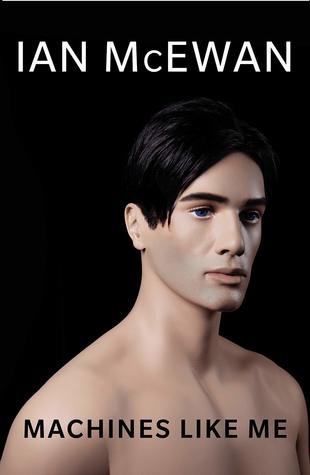
Set in the early 1980s, Ian McEwan’s fifteenth novel successfully juggles counter-factual and science fiction elements. Machines Like Me supplies a surprisingly fresh take on a by-now familiar theme: artificial intelligence and its implications for anthropoids. Narrator Charlie Friend is a thirty-something slacker who decides to blow his modest inheritance on the latest high-tech indulgence: instead of cocaine or sports cars, he buys a robot. Meet Adam: “the first convincing artificial person on the market.”
Charlie’s story begins in the United Kingdom during 1982 and his early Eighties are markedly different from what people my age (i.e. alive then) may remember. England loses an extended and bloody Falklands War to Argentina, for starters, which leads to Maggie Thatcher’s ouster and the rise of Tony Benn, a left-leaning Labour politician obscure to American readers and perhaps a few Brits. The Beatles reunite, though their comeback album, Love and Lemons, recorded with “an 80-piece orchestra” is “critically derided.” Self-driving cars dominate the roads while Charlie defiantly wheels his own ride, an electrically powered Sixties-vintage jalopy.
Charlie is given to freelance philosophizing and social observation, dispensing random nuggets of wisdom almost like the protagonist of a late Saul Bellow novel.
“Everything was rising – hopes and despair, misery, boredom and opportunity. There was more of everything.”
Personal opportunity proves somewhat elusive for Charlie, however. He pursues a fitful romance with his upstairs neighbor Miranda. She’s ten years younger, a “doctoral student in cultural history” who gradually becomes involved, intimately, with Adam. Embarrassment and mild hilarity ensue though I found this bizarre love triangle, much remarked upon by reviewers, the least remarkable aspect of the novel. Inevitably, Adam declares his “love” for Miranda (after a superhuman round of oral gratification), telling Charlie: “I feel things profoundly. More than I can say.”
The Adam and Eve bots in Machines Like Me may be programmed to experience emotions but as with their flesh-and-blood models, there’s a potentially fatal flaw in their algorithms. Those scripts can’t process the duality of human nature, our perverse capacity for good and evil. The robots are incapable of balancing two opposite notions in the vast data dumps that pass for their minds. As the legendary mathematician Alan Turing explains to Charlie in a cameo:
“There’s nothing in their beautiful code that could prepare Adam and Eve for Auschwitz.”
It’s been suggested that McEwan chose 1982 at least in part because Blade Runner, the filmic treatise on AI adapted from science fiction author Philip K. Dick, debuted that year. Maybe. Though the movie isn’t mentioned among the period pop culture references here. I suspect he chose the early Eighties in part because it was the dawn of the Device Era, that acronym age of VCRs and PCs, when the self-enclosing “personal stereo” aka Walkman replaced the boombox on city streets. As Charlie Friend puts it:
“The future kept arriving. Our bright new toys began to rust before we could get them home, and life went on much as before.”
Sounds current, no? In the end, Machines Like Me has much more to say about the present than the recent past or any possible future. Though another Charlie Friend monologue vividly reminded me of my own early Eighties.
“In my twenties, some of my most cheerful times were spent getting ready to go out. It was the anticipation rather than the thing itself. The release from work, the bath, music, clean clothes, white wine, perhaps a pull on a joint. Then stepping out into the evening, free and hungry.”
Could an algorithm generate that feeling of sweet expectation? I guess we’ll find out. Eventually.
